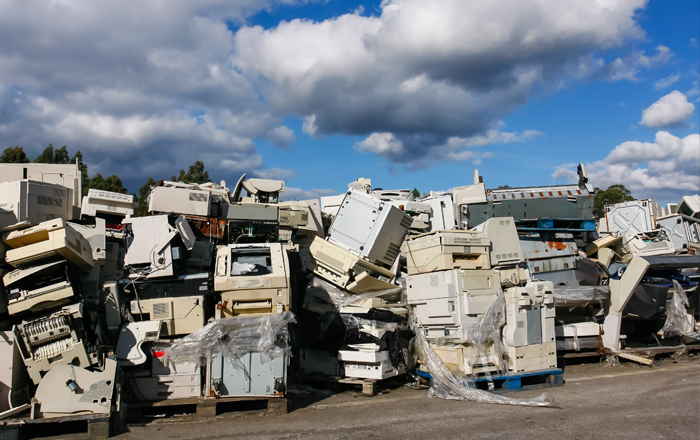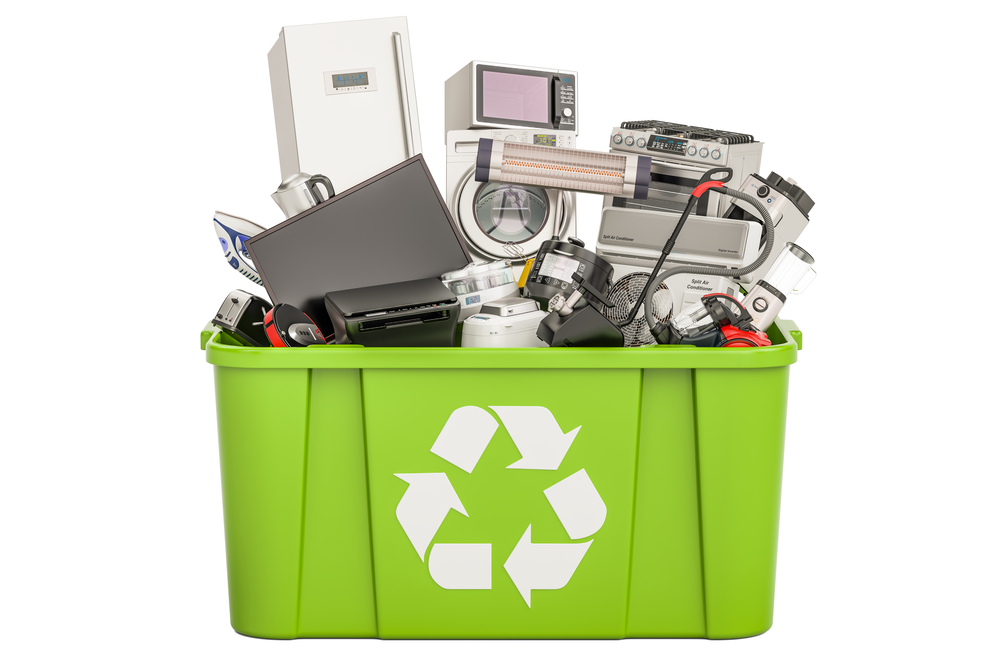
In the last 40 years, our society and economy have been revolutionized by digital technology. As sharing data is getting easier and quicker, this helps us to become more connected, productive and informed. It is also transforming our public services; if used right, these advancements can lead to increased security and improved wellbeing. Some of the benefits have been particularly visible during the Covid-19 pandemic – digital technologies have been a crucial element in the scientific research and the health services’ response, and allowed many of us to work, study, and stay connected during lockdowns despite physical distance. However, what we need to be conscious of is that, while revolutionary, these technologies are leaving a trail of carbon and waste behind – both physical and digital.
Environmental impacts
It is estimated that, per year, we globally produce up to 50 million tonnes of discarded electronic appliances, called e-waste. The UK is its second largest producer, responsible for a third of this waste (1.5 million). Unfortunately, only about 17% of this gets recycled every year in the UK.
Producing electronics requires extraction of raw materials such as metals, minerals and rare-earth elements. Apart from the fact that most of these are finite resources extracted at alarming rates, mining contributes to over 90% of global biodiversity loss and water stress impacts. Another issue is disposal of hardware. When not discarded correctly, computers, TVs, printers, fridges, and many others, can pollute air, soil and water, leading to harm for all of us – humans and wildlife. As these never completely degrade and toxic elements such as mercury, lead and cadmium can cause contamination.
In terms of data, generation and storage of emails, pictures, videos, etc. requires tremendous amounts of energy. A lot of it ends up being wasted, as around 80% of all digital data is never accessed or used again after it is first stored. The internet emits about a billion tonnes of CO2 per year; to put this into context – all 2019 worldwide flights produced roughly 915m tonnes of CO2. Despite the rate at which it is growing, the environmental impact of data is often underreported and poorly understood. To find out more about this issue, we recommend you watch this incredibly eye-opening talk ‘Make It Matter’ organized by the University of Salford Maker Space team earlier this year. The speaker was Gerry McGovern, a digital expert and author of several books on digital waste. You can find the recording here:
So – what can we do? As with any type of waste, we need to focus on the elements which can be safely eliminated or replaced. Here’s a list of simple things we can all do to help our planet.
Reducing e-waste

- Make it last
If a phone is used for at least 5 years, instead of the typical 2-3, this can cut the associated carbon emissions and water consumption by half. Take good care of your devices to ensure they last as long as possible. This can involve buying a case and a screen protector, keeping it clean (remember to sanitise!), avoiding usage while eating, drinking or next to sources of water, and avoiding overcharging the battery.
- Think before you buy
Before making a new purchase, consider whether you really need the new phone or toaster. And if you do, is there an option to buy it second-hand? If you’re in a need of a computer but for a limited time or a specific purpose (e.g. while completing a degree), there are a range of computers you can use at our University Library, or you can also borrow one for free – here you can find out how.
- Buy certified
If you decide that a new purchase is necessary, look for products which achieved certifications such as the Energy Star for energy efficiency, or Electronic Product Environmental Assessment Tool (EPEAT), which considers elimination of toxic substances, use of recycled and recyclable materials, product design for recycling, product longevity, energy efficiency, corporate performance and packaging attributes.
- Give it away
If your device still works but you don’t need or want it anymore, don’t bin it – donate it! Here you can find a list of places where you can make a donation. You can also donate to these charities: British Heart Foundation, emmaus, Fara, Get Well Gamers. And don’t forget to have a look around on social media! Use tools such as the Facebook Marketplace to check if anyone around you could give your device a new life.
- Recycle
If there is no way for you to avoid wasting electronics, ensure you recycle them instead of putting them into general waste. Items such as kitchen appliances, phones, TVs, and electrical tools can all be recycled. Here you can find information on how e-waste is recycled and where you can recycle yours.
At our University, disposal of e-waste is handled by our Digital IT team. If you need to dispose of an item, click here to contact the team, or here to view all of the University’s waste-related guidelines. If you’re a staff member, you can also use WARP-it, our reuse scheme, for items such as printer cartridges – read more here.
Reducing digital waste

- Disconnect
You can decrease the amount of data generated by your devices simply by using them less. While at work this might be tricky, consider alternative ways of spending your free time, such reading paper books or outdoor activities – why not complete our Tree Trail or make your garden hedgehog friendly?
- Meetings
Did you know that a standard video call uses 7.5 times more data than a standard audio call? Consider this when making calls and think about whether having your camera on is always necessary. And, when possible, opt for a good old phone call instead.
- Emails
We send hundreds of these each week – but do we have to? If you do need to send one, swap attachments for links whenever you can – carbon cost of a standard email is around 4g CO2e (carbon dioxide equivalent) – with attachments this can increase to 50g CO2e! Also, consider your signature – are there any heavy elements, such as a logo, which you could remove for replies?
- Keep files in the ‘cloud’
Whenever possible, avoid downloading files from shared drives (such as Google Drive or OneDrive) onto your computer – for example when all you need is to view it without editing.
We hope you found this post useful! Here are our sources and some other useful websites in case you want to read more: DoSomething, Digital Detox, WEEE Forum, Gerry McGovern’s website, World Economic Forum, UK Parliament Publication, Carbon Literacy Project, Technology in the NHS blog (GOV.UK)
Follow us on social media for sustainability related content,
or to get in touch:
Photo credit: Sustainability Voices, Combined Resources, Cleanfox
